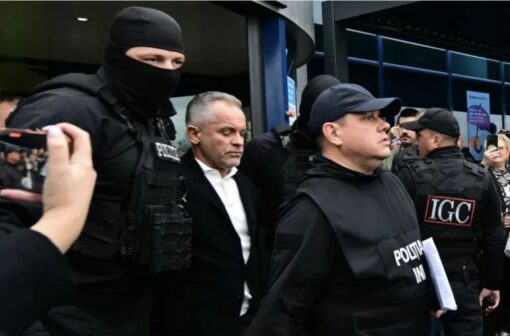Moldovan oligarch Vladimir Plahotniuc has been extradited to Moldova to face charges related to a massive $1 billion fraud that has shaken the country’s financial and political systems.
Plahotniuc, a former influential businessman and politician, has been under investigation for years due to allegations of orchestrating large-scale financial schemes and corruption that drained public banks and defrauded countless investors.
His extradition marks a significant milestone in Moldova’s ongoing efforts to hold powerful figures accountable and restore confidence in the rule of law.
Authorities confirmed that Plahotniuc arrived in Moldova under tight security, facing charges that include embezzlement, money laundering, and abuse of power.
The Moldovan judiciary has emphasized that the extradition was conducted in full compliance with international legal agreements, signaling the country’s commitment to cooperating with foreign jurisdictions to bring high-profile suspects to justice.

Observers note that the extradition of Plahotniuc could have lasting implications for Moldova’s financial sector and the fight against corruption.
The case against Vladimir Plahotniuc centers on a series of transactions involving several Moldovan banks that were effectively looted between 2014 and 2015.
Investigators allege that Plahotniuc used a network of shell companies, intermediaries, and offshore accounts to siphon funds, leaving Moldova’s banking system on the brink of collapse.
The scandal, often referred to as the “Moldovan banking fraud,” resulted in significant economic instability and drew international attention to the challenges of governance and financial oversight in the country.
Plahotniuc’s extradition follows years of legal maneuvers, including efforts to evade prosecution. He spent time abroad, reportedly living in several countries while Moldovan authorities sought his return.
The extradition process involved extensive negotiations between Moldova and foreign law enforcement agencies, ensuring that due process was observed while navigating the complex international legal frameworks that protect individuals facing criminal charges.
The Moldovan government has hailed the extradition as a historic step in demonstrating that no individual is above the law. Officials have stressed that Plahotniuc’s return to the country is an opportunity to uncover the full extent of the $1 billion fraud and to pursue accountability for all those involved in orchestrating the scheme.
Analysts suggest that the trial could reveal systemic weaknesses in Moldova’s financial institutions and political oversight mechanisms, providing a basis for reforms to prevent similar scandals in the future.
Vladimir Plahotniuc, known for his influence in both business and politics, has long been a controversial figure in Moldova. He held positions that allowed him to exert significant control over political processes, the media, and banking operations. Critics argue that his power enabled the manipulation of public funds and allowed the fraud to continue unchecked for years.
Supporters, on the other hand, have sometimes framed him as a successful entrepreneur navigating a complex political landscape. The extradition underscores the extent to which international and domestic pressure can challenge entrenched power structures.
The trial of Plahotniuc is expected to be closely monitored by both Moldovan citizens and the international community. Human rights organizations, anti-corruption advocates, and financial watchdogs have all expressed interest in ensuring that the proceedings are transparent and adhere to the principles of justice.
Observers also expect the case to serve as a warning to other oligarchs and powerful figures in the region, demonstrating that wealth and influence do not exempt individuals from legal accountability.
In addition to the legal implications, Plahotniuc’s extradition carries political significance. Moldova has faced ongoing scrutiny for governance issues, corruption, and financial mismanagement. Bringing a high-profile oligarch like Plahotniuc to trial may strengthen public trust in institutions and signal a shift toward greater transparency and accountability.
Political analysts note that the case could also influence upcoming elections and reform initiatives, as citizens demand more robust oversight of financial and governmental systems.
The international community has welcomed the extradition as a positive step toward upholding the rule of law in Eastern Europe. European Union officials and foreign diplomats have highlighted the importance of Moldova’s commitment to prosecuting corruption and ensuring that economic crimes are not tolerated.
Plahotniuc’s trial is likely to attract global attention, not only for its scale but also for its potential to reshape Moldova’s economic and political landscape.
Vladimir Plahotniuc’s legal team has pledged to contest the charges, asserting that the case against him is politically motivated.
However, prosecutors maintain that the evidence is substantial, pointing to a combination of bank records, financial audits, and communications that implicate Plahotniuc directly in orchestrating the fraud.
The trial promises to be complex and protracted, with legal experts noting that it may take months or even years to reach a final verdict. by
Beyond the courtroom, the extradition of Plahotniuc raises questions about Moldova’s capacity to recover the defrauded funds and restore the integrity of its banking system. Efforts are underway to track assets, freeze suspicious accounts, and implement stronger financial regulations to prevent future abuses.
The scandal involving Plahotniuc serves as a reminder of the vulnerabilities in national financial systems when oversight is weak and influential individuals operate with impunity.
The case also highlights the role of international cooperation in tackling financial crime.
Moldova’s collaboration with foreign governments and law enforcement agencies demonstrates the increasing importance of cross-border efforts to apprehend individuals accused of large-scale fraud.

Plahotniuc’s extradition may encourage other countries to strengthen legal frameworks and enhance cooperation to prevent similar cases from going unresolved.
As Moldova prepares for the trial of Vladimir Plahotniuc, public interest is expected to remain high. Citizens, activists, and media outlets are closely following the developments, eager to see justice served for the $1 billion fraud that has left a lasting impact on the nation’s economy.
The proceedings may also set a precedent for how the country addresses future cases of corruption involving high-profile individuals, signaling a broader commitment to accountability and good governance.
The extradition of Moldovan oligarch Vladimir Plahotniuc represents a critical moment for Moldova’s legal system, financial institutions, and political landscape. The trial will not only determine Plahotniuc’s personal fate but also reflect the country’s ability to confront corruption at the highest levels.
With international attention and domestic scrutiny focused on the case, Moldova has the opportunity to demonstrate that no individual, regardless of wealth or influence, is immune from justice.
Plahotniuc’s extradition underscores the ongoing struggle for transparency, accountability, and the rule of law in Eastern Europe, while providing a cautionary tale for powerful figures seeking to exploit financial and political systems.


